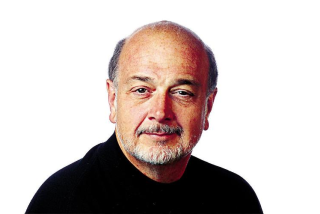Richard Dougherty, 65; Ex-Times Bureau Chief
- Share via
NEW YORK — Richard Dougherty, a former vice president of the Metropolitan Museum of Art and former New York bureau chief of the Los Angeles Times, died of lung cancer Tuesday at a hospital in Southampton, N.Y. He was 65.
Dougherty left The Times in 1971 to become press secretary for George McGovern’s presidential campaign. He was a deputy New York City police commissioner for community relations in the 1950s and a city hall reporter and Washington political correspondent for the New York Herald Tribune.
The author of five novels, Dougherty brought an author’s keen eye for detail and plot to the newspaper business. He was an urbane, witty journalist who wrote with insight, style and humor.
The stories he covered included the presidential campaign and cortege of Sen. Robert F. Kennedy; the Administration of John V. Lindsay, mayor of New York from 1965 to 1973; profiles of the three astronauts who made the historic flight to the moon, the gubernatorial and presidential campaigns of former Gov. Nelson A. Rockefeller and hundreds of stories painting a perceptive portrait of New York.
Universal Obituary
When his friend and source Jim Callahan, an advertising manager and reporter and the principal spirit behind the weekly newspaper the Irish Echo, died, the obituary Dougherty wrote appeared on Page 1 of The Times. The editors decided it was the universal obituary for every man whose seemingly ordinarily life would not make the front page.
“They buried Jim Callahan Tuesday,” Dougherty wrote. “They had a solemn high Requiem Mass for him in St. Bartholomew’s Church, in Jackson Heights, and then they buried him in that endless and forbidding Calvary Cemetery in the borough of Queens.
“Calvary is a long way from the soft green loveliness of County Tipperary where Callahan was born 60 years ago. He would have had a laugh at ending up in that inhospitable tract of tombstones at the edge of the Long Island Expressway.”
At times, Dougherty candidly viewed journalism as a way station between writing novels--although he could feel as much at ease chatting with Callahan as with friends and sources like the late columnist Walter Lippmann (whom he sometimes referred to privately with street-wise admiration as “Wally the Lip”), Brooke Astor (with whom he gossiped almost daily) and political analyst Theodore H. White, author of the “Making of the President” series.
White’s Portrait
In his book “Goodbye Mr. Christian,” an account of his experiences with McGovern, Dougherty summed up his close friend in a paragraph:
“Teddy White has a mind like a woodland pond--busy with movement and sound: bird song, bugs, the whir of wings, snaps in the underbrush, fish jumping. Sometimes there are clouds overhead: gloom and rolls of thunder; sometimes theoretical mists descend: ideas flash like lightning, insights strike like hailstones. My God, of course, why had he not thought of that before? The beaverlike figure sits up, the bright eyes widen behind thick lenses, the mouth opens in unabashed admiration of the mind’s fecundity.”
“The Commissioner,” which was the basis for the movie and television series “Madigan,” was the most successful of his novels.
Dougherty joined the Metropolitan Museum of Art in 1974 and, until his retirement a decade later, was in charge of fund raising, public relations and membership.
Dougherty, a native of Bolivar, N.Y., was a graduate of Columbia University. He is survived by two sisters, a daughter and his wife, the former Cynthia Abbott.
More to Read
Sign up for our Book Club newsletter
Get the latest news, events and more from the Los Angeles Times Book Club, and help us get L.A. reading and talking.
You may occasionally receive promotional content from the Los Angeles Times.










